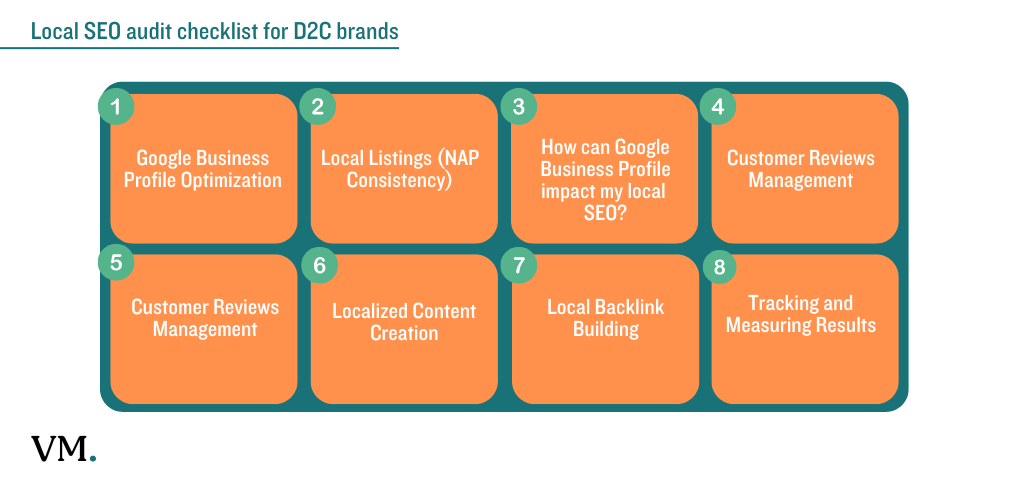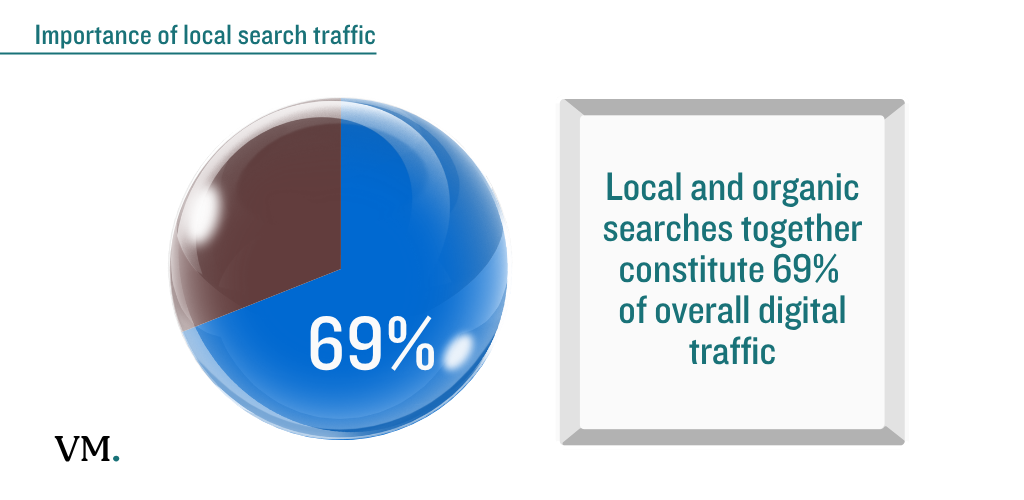Direct-to-consumer (D2C) brands can’t afford to ignore local search optimization and not do a local SEO audit. Whether you have a single location or multiple distribution hubs, optimizing your local online presence drives nearby customers and boosts brand trust. This comprehensive Local SEO Audit Checklist for D2C Brands will help you ensure every aspect of your local SEO is on point.
Why Local SEO Matters for D2C Brands
- Increased Visibility: Improves your brand’s appearance in local search results when customers seek products you sell.
- Trust & Authority: Verified business listings and positive reviews foster confidence, critical for D2C shoppers.
- Competitive Advantage: Outperform traditional and local competitors by being visible at every step of the buyer journey.
Local SEO Audit Checklist for D2C Brands

1. Google Business Profile Optimization
- Claim and verify your Google Business Profile.
- Ensure business name, address, phone number (NAP), and categories are accurate and consistent.
- Add high-quality photos of your storefront, products, and team.
- Regularly update business hours, especially during holidays or special events.
- Enable messaging to interact directly with customers.
2. Local Listings (NAP Consistency)
- Audit all business listings on platforms like Yelp, Apple Maps, Bing Places, and niche industry directories.
- Ensure NAP information matches exactly across every listing.
- Remove duplicate or outdated listings to avoid confusing search engines.
- Add your city and state in page titles, meta descriptions, H1 headings, and within content where relevant.
- Create location-specific landing pages for each service area or distribution point.
- Implement schema markup (LocalBusiness, Store) to help search engines understand your local relevance.
3. How can Google Business Profile impact my local SEO?
Your Google Business Profile (GBP) is critical. It influences local search rankings, customer engagement, and conversions. Claiming, verifying, and regularly updating your GBP with accurate business info, photos, hours, and messaging features can improve your ranking and make your brand stand out.
4. Customer Reviews Management
- Encourage happy customers to leave reviews on Google and other prominent platforms.
- Respond to all reviews, both positive and negative, with professionalism.
- Monitor reviews for spam or policy violations and report them as needed.
5. Localized Content Creation
- Publish blog posts, videos, or guides that address local events, community stories, or neighborhood trends.
- Showcase local partnerships or sponsorships to strengthen your hometown connection.
- Feature case studies or testimonials from local customers.
6. Mobile and Voice Search Optimization
- Test your website’s performance on mobile devices—fast loading and simple navigation is essential.
- Use conversational keywords that mirror how users speak (especially for voice search).
- Update contact and location information to be easily accessible on small screens.
7. Local Backlink Building
- Forge partnerships with local organizations or media for backlink opportunities.
- Submit your brand to reputable local business directories.
- Sponsor or participate in local community events to earn news and media mentions.
8. Tracking and Measuring Results
- Set up Google Analytics and Google Search Console to track local SEO traffic.
- Monitor Google Business Profile Insights for visibility, interaction, and direction requests.
- Track keyword rankings for local searches relevant to your D2C products.
Local SEO Audit Checklist for D2C Brands: Table Overview
| Checklist Area | Key Actions for D2C Brands |
|---|---|
| Google Business Profile | Claim, verify, update NAP, photos, hours, enable messaging |
| Listings Consistency | Audit NAP on all platforms, remove duplicates |
| On-Page Local SEO | Add city/state, location pages, local schema |
| Reviews | Request, respond, monitor, and report |
| Localized Content | Create content for local events, partnerships, case studies |
| Mobile & Voice Search | Mobile performance, conversational keywords, easy contact info |
| Local Backlinks | Build community relationships, directory submissions, local PR |
| Tracking | Use Analytics, Search Console, monitor rankings and insights |
Local SEO Audit Checklist for D2C Brands — Key Statistics for 2025
Optimizing your local SEO strategy as a D2C brand has never been more crucial, supported strongly by compelling statistics that highlight the immense value and impact of local search in today’s digital landscape.
Importance of Local Search Traffic
-
Local and organic searches together constitute 69% of overall digital traffic. Local searches alone contribute about 22.6% of website traffic for location-based businesses, with this share rising steadily over recent years.
-
Over 46% of all Google searches have local intent, emphasizing how heavily consumers rely on local SEO to find products and services nearby.

Consumer Search Behavior
-
8 in 10 US consumers say they search for a local business online at least once a week, and 32% use local search daily—demonstrating a consistent demand for local product information and availability.
-
Mobile local searches that contain “can I buy” or “to buy” phrases have increased by 500% over the past two years, a telling signal for D2C brands to optimize for transactional local queries.
-
More than 1.5 billion “near me” searches happen every month, connecting users directly to local availability and services.
Impact on Purchase and Engagement
-
76% of consumers who perform “near me” type searches visit a related business within a day, and 88% of smartphone local searchers visit or call a store within a week.
-
About 28% of local searches with a nearby intent result in a purchase, underlining the direct conversion potential of local SEO efforts.
-
Positive reviews and business profiles strongly influence consumer behavior: 88% of customers read Google Reviews before visiting a local business, and 71% won’t consider a business with less than 3 stars.
Google Business Profile and Listings
-
Despite this importance, 56% of local businesses still haven’t claimed their Google Business Profile, a missed opportunity to dominate local search visibility.
-
Optimized Google Business Profile signals carry 32% weight in local pack rankings, the highest among ranking factors like on-page content and reviews.
-
Errors in business information are costly: 62% of consumers will completely avoid a business if they find incorrect info online.
Platform Preferences
- Google remains dominant, with 72% of consumers using Google Search for local queries, followed by Google Maps at 51%. However, younger audiences (18-24) also heavily use Instagram (67%) and TikTok (62%) for local searches.
Mobile and Voice Search Growth
-
Over 80% of local searches occur on mobile devices, making mobile-friendly websites essential for local SEO success.
-
Voice search is mainstream, with more than 70% of consumers using voice assistants for local query intents, adding another layer of optimization needs for D2C brands.
These statistics clearly emphasize the critical importance of a robust, consistent local SEO audit and ongoing optimization for D2C brands aiming to attract nearby customers, drive conversions, and build lasting brand loyalty in 2025.
If you are implementing or refining your Local SEO Audit Checklist for D2C Brands, these data points highlight the areas that will yield the best ROI and competitive edge.
Would you like me to help incorporate these statistics directly into your blog with explanations?
Final Thoughts
Implementing this Local SEO Audit Checklist for D2C Brands ensures your business appears when and where it matters most—at the exact moment a local customer needs your product. Treat local SEO as an ongoing process to maintain visibility, build trust, and convert nearby searchers into loyal brand advocates.
Keyword used: Local SEO Audit Checklist for D2C Brands
Local SEO Checklist for Small Businesses
How to Do a Local SEO Audit: A Step-By-Step Guide
FAQ
What is local SEO and why is it important for D2C brands?
Local SEO is the process of optimizing your online presence to attract more business from relevant local searches. For D2C (direct-to-consumer) brands, local SEO ensures your products appear to customers in your service or distribution areas, increasing visibility, trust, and conversions from nearby shoppers.
What are the key components of a local SEO audit for D2C brands?
A thorough local SEO audit includes:
- Google Business Profile optimization
- Ensuring NAP (Name, Address, Phone) consistency across listings
- On-page SEO with local intent (city/state in titles, content, schema)
- Customer reviews management
- Creation of localized content
- Mobile and voice search optimization
- Building local backlinks
- Tracking and analyzing results with tools like Google Analytics
How can Google Business Profile impact my local SEO?
Your Google Business Profile (GBP) is critical. It influences local search rankings, customer engagement, and conversions. Claiming, verifying, and regularly updating your GBP with accurate business info, photos, hours, and messaging features can improve your ranking and make your brand stand out.
Why is NAP consistency across all platforms so important?
Inconsistent Name, Address, and Phone details confuse search engines and customers. This can lower your local rankings and harm your credibility. A successful local SEO audit requires auditing all listings and ensuring the exact NAP is consistent across directories like Yelp, Bing Places, Apple Maps, and niche sites.
How do customer reviews affect local SEO for D2C brands?
Positive reviews increase consumer trust and dramatically influence purchase decisions. Reviews also affect search engine ranking algorithms. Managing reviews by encouraging happy customers, responding professionally, and reporting spam ensures your online reputation supports your local SEO efforts.
What role does localized content play in local SEO?
Localized content connects your brand with the local community and improves search relevance. Creating blog posts, videos, and guides focused on local events, news, customer stories, and partnerships can attract nearby customers and improve your website’s local authority.
How important is mobile and voice search optimization in 2025?
Extremely important! Over 80% of local searches happen on mobile devices, and voice searches for local queries continue to rise. Ensuring your website is mobile-friendly, loads quickly, and uses conversational keywords will make it easier for local customers to find and buy from you.
What statistics highlight the importance of local SEO for D2C brands today?
- 46% of all Google searches have local intent.
- 76% of “near me” searches lead to a store visit within a day.
- 56% of businesses have yet to claim their Google Business Profile.
88% of customers read Google Reviews before visiting a business.
These stats underscore that local SEO is essential for driving traffic, increasing sales, and building trust.
How do I measure the success of my local SEO efforts?
-
Use Google Analytics and Google Search Console to track traffic and keyword rankings. Monitor Google Business Profile Insights for visibility, interactions, and customer actions such as calls or direction requests. Regularly review your local rankings and review volume to adjust your strategy.
How often should I perform a local SEO audit?
Local SEO is ongoing. Perform a full audit at least twice a year and review critical elements like business listings and reviews monthly. Regular audits help identify and fix issues, keep information accurate, and adapt to evolving search algorithms and customer behaviors.
If you want, I can also provide answers customized for your specific D2C brand or industry niche. Would you like me to do that?
Share:




